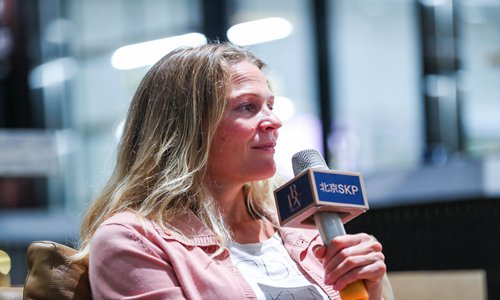HOME >> ARTS
‘Two Sisters’ shows tragic impact of Islamic extremism
By Chen Xi Source:Global Times Published: 2019/9/11 19:28:41

Åsne Seierstad Photo: Courtesy of CITIC Press Group

The Chinese version of Two Sisters Photo: Chen Xi/GT
A tall and fit figure in a black colored dress, the deep blue eyes peeking out from behind the war correspondent's blond hair seemed to have seen too much of war. Those eyes belonged to Åsne Seierstad, a Norwegian freelance journalist and writer, who had arrived in Beijing to attend the Chinese language launch of her book Two Sisters.
A war correspondent since the 1990s, Seierstad is no stranger to the battlefield, especially when it comes to covering the war in Afghanistan and the Battle of Baghdad. Her in-depth coverage of people's suffering due to wars and terrorist attacks led to her being named one of the 100 most influential women in Europe.
"As a journalist, I have a high curiosity to explore humanity. That's part of the reason that I wanted to write the story Two Sisters, and I wanted to come to China to see what my Chinese readers think about my work," Seierstad told the Global Times in an interview on Friday.
Dire warning
Two Sisters covers the true story of a Norwegian immigrant family from Somalia. On the evening of October 17, 2013, Sadiq Juma received an email from his two teenage daughters that read, "Muslims are under attack from all quarters, and we need to do something…"
Juma soon learned that the two sisters had left to Syria to support Islamic terrorists. This lead to tragedy for the family as Juma departed to Syria to bring them back, and their mother, who never integrated into Norwegian life, took their sons and returned to Somalia, which they had fled due to war.
"I first refused Sadiq to write the book because the family is telling this story from their own perspective, while as a journalist, I was willing to see the core of the matter. But later I realized that this event was very important and decided to meet him," she said.
Seierstad explained that many young people from Europe began to participate in jihadist activities starting in 2012. Most of them registered through some recruitment websites and entered the war zone in Syria through Turkey. Since European countries were not taking prompt measures to stop this recruitment, thousands of families were broken.
"Sadiq told me he hoped the book can be a warning to those young people, like his daughters, that are going to be extreme or radical, which indeed was my reason to write the book. Sadiq said he was very shocked and disbelieving when he received his daughters' emails. Then he started to recall recent events and felt very guilty that he did not notice his two lovely daughters had gradually become extremists," Seierstad said, noting that she did receive some feedback from her Norwegian readers that the book has helped warn some of their friends who were thinking about joining Islamic extremist groups.
Intercultural communication
Some Chinese readers at the book launch pointed out that, besides the religious aspect, the book also makes readers think about family education.
Seierstad said some families like Juma's often hide their faces or refuse to reveal their names when talking with the media.
"Those families have a commonality: They would use the excuse that 'my child has been brainwashed' and 'our child are too young to take responsibility' to shirk their duty as parents. However, it is not true. Those children could not have such a power and decision to go to Syria just by 'being brainwashed,' and their parents should take up the duty to protect their children's mental health," she said.
In Norway, children from more than 90 families have gone to Syria just like the two sisters, and many parents are still hoping their children will come home soon.
This is not the first time that Seierstad has written about religion and family. The Bookseller of Kabul, one of her most famous books, has sold more than 2 million copies around the world. In the book, she portrays the inner workings of an Afghan family with whom she lived for several months, revealing a real traditional Afghan family's story to the world for the first time.
While the threat of Islamic extremism may seem rather distant from everyday Chinese readers' lives, Seierstad still believes the Juma family's story is an important one to tell.
"I think literature does not have a country border and can unite everyone together... Now that I am around these Chinese readers, I am thinking that China is a completely different country, and I want to find out how Chinese understand this book. What they think of the reason why the sisters changed their minds to be extremists. This book is a collection of different points that allow us to have open minds and open discussions, which is why I like literature," Seierstad said.
Newspaper headline: Broken family
Posted in: BOOKS